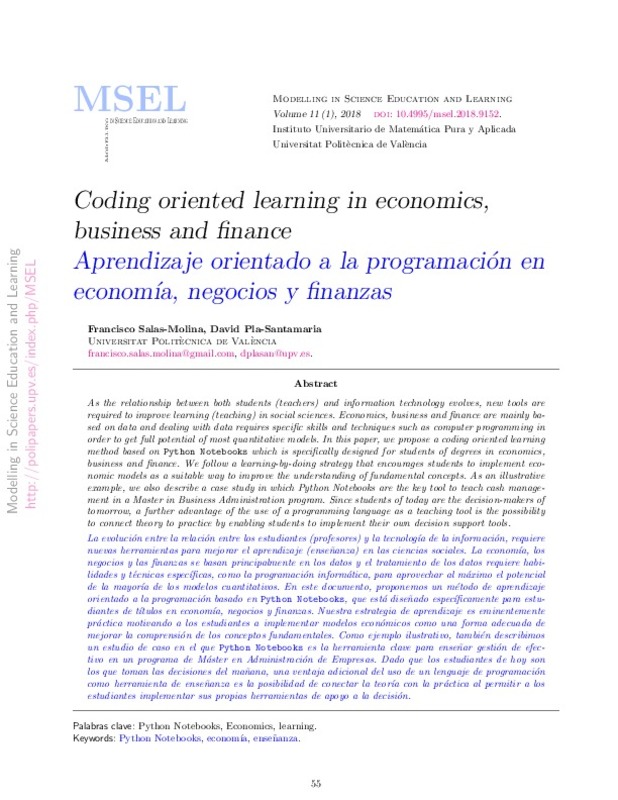JavaScript is disabled for your browser. Some features of this site may not work without it.
Buscar en RiuNet
Listar
Mi cuenta
Estadísticas
Ayuda RiuNet
Admin. UPV
Coding oriented learning in economics,business and finance
Mostrar el registro sencillo del ítem
Ficheros en el ítem
| dc.contributor.author | Salas Molina, Francisco
|
es_ES |
| dc.contributor.author | Pla Santamaría, David
|
es_ES |
| dc.date.accessioned | 2018-03-27T08:09:14Z | |
| dc.date.available | 2018-03-27T08:09:14Z | |
| dc.date.issued | 2018-02-05 | |
| dc.identifier.uri | http://hdl.handle.net/10251/99807 | |
| dc.description.abstract | [EN] As the relationship between both students (teachers) and information technology evolves, new tools are required to improve learning (teaching) in social sciences. Economics, business and finance are mainly based on data and dealing with data requires specific skills and techniques such as computer programming in order to get full potential of most quantitative models. In this paper, we propose a coding oriented learning method based on Python Notebooks which is specifically designed for students of degrees in economics, business and finance. We follow a learning-by-doing strategy that encourages students to implement economic models as a suitable way to improve the understanding of fundamental concepts. As an illustrative example, we also describe a case study in which Python Notebooks are the key tool to teach cash management in a Master in Business Administration program. Since students of today are the decision-makers of tomorrow, a further advantage of the use of a programming language as a teaching tool is the possibility to connect theory to practice by enabling students to implement their own decision support tools. | es_ES |
| dc.description.abstract | [ES] La evolución entre la relación entre los estudiantes (profesores) y la tecnología de la información, requiere nuevas herramientas para mejorar el aprendizaje (enseñanza) en las ciencias sociales. La economía, los negocios y las finanzas se basan principalmente en los datos y el tratamiento de los datos requiere habilidades y técnicas específicas, como la programación informática, para aprovechar al máximo el potencial de la mayoría de los modelos cuantitativos. En este documento, proponemos un método de aprendizaje orientado a la programación basado en Python Notebooks, que está diseñado específicamente para estudiantes de títulos en economía, negocios y finanzas. Nuestra estrategia de aprendizaje es eminentemente práctica motivando a los estudiantes a implementar modelos económicos como una forma adecuada de mejorar la comprensión de los conceptos fundamentales. Como ejemplo ilustrativo, también describimos un estudio de caso en el que Python Notebooks es la herramienta clave para enseñar gestión de efectivo en un programa de Máster en Administración de Empresas. Dado que los estudiantes de hoy son los que toman las decisiones del mañana, una ventaja adicional del uso de un lenguaje de programación como herramienta de enseñanza es la posibilidad de conectar la teoría con la práctica al permitir a los estudiantes implementar sus propias herramientas de apoyo a la decisión. | es_ES |
| dc.language | Inglés | es_ES |
| dc.publisher | Universitat Politècnica de València | |
| dc.relation.ispartof | Modelling in Science Education and Learning | |
| dc.rights | Reconocimiento - No comercial (by-nc) | es_ES |
| dc.subject | Python Notebooks | es_ES |
| dc.subject | Economía | es_ES |
| dc.subject | Enseñanza | es_ES |
| dc.subject | Economics | es_ES |
| dc.subject | Learning | es_ES |
| dc.title | Coding oriented learning in economics,business and finance | es_ES |
| dc.title.alternative | Aprendizaje orientado a la programación en economía, negocios y finanzas | es_ES |
| dc.type | Artículo | es_ES |
| dc.date.updated | 2018-03-27T07:07:38Z | |
| dc.identifier.doi | 10.4995/msel.2018.9152 | |
| dc.rights.accessRights | Abierto | es_ES |
| dc.contributor.affiliation | Universitat Politècnica de València. Escuela Politécnica Superior de Alcoy - Escola Politècnica Superior d'Alcoi | es_ES |
| dc.contributor.affiliation | Universitat Politècnica de València. Departamento de Economía y Ciencias Sociales - Departament d'Economia i Ciències Socials | es_ES |
| dc.description.bibliographicCitation | Salas Molina, F.; Pla Santamaría, D. (2018). Coding oriented learning in economics,business and finance. Modelling in Science Education and Learning. 11(1):55-64. https://doi.org/10.4995/msel.2018.9152 | es_ES |
| dc.description.accrualMethod | SWORD | es_ES |
| dc.relation.publisherversion | https://doi.org/10.4995/msel.2018.9152 | es_ES |
| dc.description.upvformatpinicio | 55 | es_ES |
| dc.description.upvformatpfin | 64 | es_ES |
| dc.type.version | info:eu-repo/semantics/publishedVersion | es_ES |
| dc.description.volume | 11 | |
| dc.description.issue | 1 | |
| dc.identifier.eissn | 1988-3145 | |
| dc.description.references | da Costa Moraes, M. B., Nagano, M. S., and Sobreiro, V. A. (2015). Stochastic cash ow management models: A literature review since the 1980s. In Decision Models in Engineering and Management, pages 11-28. Springer International Publishing. | es_ES |
| dc.description.references | DiSessa, A. A. (2001). Changing minds: Computers, learning, and literacy. Mit Press. | es_ES |
| dc.description.references | Guzdial, M. (2010). Why is it so hard to learn to program? In Making software: What really works, and why we believe it, pages 111-121. O'Reilly Media, Inc. | es_ES |
| dc.description.references | Ketcheson, D. I. (2014). Teaching numerical methods with iPython notebooks and inquiry-based learning. In Proceedings of the 13th Python in Science Conference. SciPy. org. | es_ES |
| dc.description.references | Myers, G. J., Sandler, C., and Badgett, T. (2011). The art of software testing. John Wiley & Sons. | es_ES |
| dc.description.references | Rossant, C. (2014). IPython interactive computing and visualization cookbook. Packt Publishing Ltd. | es_ES |
| dc.description.references | VanderPlas, J. (2016). Python Data Science Handbook: Essential Tools for Working with Data. O'Reilly. | es_ES |








